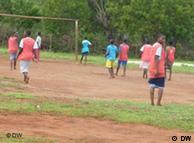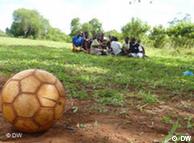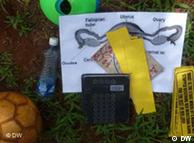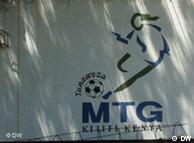Football changes girls' lives in rural Kenya
'We can do it' is the slogan of an organization in Kenya called Moving
The Goalposts. It uses football to instill self-confidence in girls in
Kenya and aims for nothing less than societal change.
The sound of girls playing football and clapping wildly when they
score goals is not a sound often heard in rural Kenya. But here in the
Kilifi district, north of the city of Mombasa, it has become fairly
common. In this region, some 3,000 girls play football.
Today, on a dusty pitch in the village of Sokoke, 22 girls are
playing in a training session, half in blue bibs, half in red ones. Many
are barefoot. Despite the intense heat, the girls are constantly in
motion.
But these girls are learning a lot more than just how to dribble,
kick and score; they are learning how to think in new ways, ways that
are unusual for young women in this part of the world.
 Bildunterschrift: Großansicht des Bildes mit der Bildunterschrift: Teaching self-confidence on the field and in life Bildunterschrift: Großansicht des Bildes mit der Bildunterschrift: Teaching self-confidence on the field and in life
"It is about a teenage girl realizing her goals in life, making her
own decisions, including sexual decisions," Margaret Belewa, program
manager of the Moving the Goalposts project, said.
"Most of the times, those decisions are made by the parents or by the
husband. How can we help her so that she can take control of her life?"
Moving the Goalposts (MTG) aims to empower girls and young women in
Kilifi, one of the poorest districts in Kenya, through football.
Remaking lives
Belewa grew up in this area, where life can be hard. Water is in
short supply and many families don't have enough food. Children often
have to travel long distances to get to school.
If the parents can afford the school fees for secondary education, it
is mostly the girls who suffer as boys always come first. Only one in
five girls get a secondary education.
 Bildunterschrift: Großansicht des Bildes mit der Bildunterschrift: Group instruction on the soccer pitch Bildunterschrift: Großansicht des Bildes mit der Bildunterschrift: Group instruction on the soccer pitch
MTG is trying to change this, and staff member Lydia Kasina is an
example for the project's success. The self-confident, well-educated
young woman would have had a very different life without MTG. She
starting participating in the football project several years ago, now
MTG is helping her go to college.
"If MTG was not here in Kilifi maybe I would be married with many
children," says Kasina. "But now I am more informed, I am now supporting
myself and my family."
Kasina now works for MTG, coordinating its health education program
and teaching teenage girls about their bodies and sex, one of the
project's main goals. Girls here often get pregnant while they are still
in school and the levels of HIV infection are twice as high among this
group than among boys of the same age.
Our bodies, ourselves
On a playground in Sokoke, over thirty girls are moving in a circle
while they sing during a peer education session. The topic is
menstruation.
The song talks about how a young girl can talk to her mother about
her body, and trust her to keep it secret. In this group the girls can
talk about these kinds of subjects openly and without being ashamed of
what they don't know.
Besides learning about their bodies, the girls are also taught how to
become future leaders - something which most of them have to learn from
scratch. Women in rural Kenya rarely take on leadership roles; most
mayors and national politicians are men. It is a challenge to change the
girls' concepts of themselves in a world dominated by men.
 Bildunterschrift: Großansicht des Bildes mit der Bildunterschrift: The girls learn about their bodies Bildunterschrift: Großansicht des Bildes mit der Bildunterschrift: The girls learn about their bodies
MTG's goal is nothing less than to change Kenyan society, which is why they chose the name they did.
"Everybody asks: Why Moving the Goalposts?" Belewa said. "But here we
are talking about social goalposts. How do we move the girls, the
teenage girls in Kilifi to a status like any other girl in the world?"
MTG is now widely recognized, far beyond Kilifi and Kenya. The
organization was even invited to take part in the "Football For Hope
project" organized by the world football association FIFA, to support
development programs aimed at young people. More than 30 teams of
players under the age of 18 from all over the world get the chance to
travel to South Africa during the World Cup. MTG is one of them.
17-year-old Sarah is on that team, and she has plans for her future
once she returns. She wants to finish her education, then she would like
to become a famous broadcaster so that she can pass her knowledge to
the people in Kenya. Because, she says, there are still many people who
don't understand that women are equal to men.
Overcoming resistance
The MTG team know a lot needs to be done before women can be treated
as equal partners in Kenyan society, but they're used to overcoming
resistance. At first, Kasnia says, parents did not want their daughters
playing football, worrying about their wearing shorts that exposed their
thighs. But things have changed.
 Bildunterschrift: Großansicht des Bildes mit der Bildunterschrift: Working for change through football Bildunterschrift: Großansicht des Bildes mit der Bildunterschrift: Working for change through football
"Like this year, I had a father who came with his daughter, he
wants his daughter to join our organization so that she can be involved
in all that activities we are doing," she said.
In the beginning, there were only 120 girls playing football in
Kilifi. Now there are more than 3,000 girls and 27 league fields they
play on. Yet Margaret Belewsa hopes to reach even more girls in the
future, so the changes in society will be even bigger.
"We are just working in a small part of one corner now, but in time
that contribution will be felt nationally because I can imagine of the
girls we are working with from Kilifi could be a future leader," she
said. "That is a moment everybody will celebrate."
Authors: Julia Kuckelkorn and Josephat Kioko (jam)
Editor: Ranjitha Balasubramanyam
http://www.dw-world.de/dw/article/0,,5746793,00.html
| 








